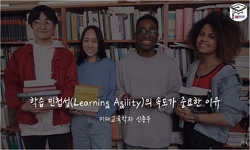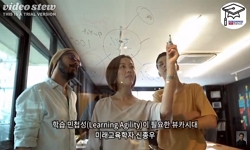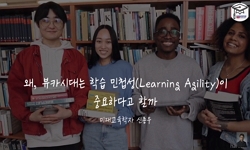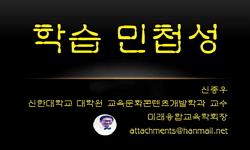This study was conducted focusing on the innovative behavior necessary for the long-term survival of an organization in a business environment in which uncertainty and complexity are increasing. To this end, the relationship between issue leadership a...
http://chineseinput.net/에서 pinyin(병음)방식으로 중국어를 변환할 수 있습니다.
변환된 중국어를 복사하여 사용하시면 됩니다.
- 中文 을 입력하시려면 zhongwen을 입력하시고 space를누르시면됩니다.
- 北京 을 입력하시려면 beijing을 입력하시고 space를 누르시면 됩니다.

이슈 리더십이 혁신 행동에 미치는 영향 연구 : 학습 민첩성의 매개효과 = The Mediating Effect of Learning Agility in the Relationship between Issue Leadership and Innovative Behavior
한글로보기https://www.riss.kr/link?id=A107979048
- 저자
- 발행기관
- 학술지명
- 권호사항
-
발행연도
2021
-
작성언어
Korean
-
주제어
Issue leadership ; Learning agility ; Innovative behavior ; Mediating effect ; Feedback seeking ; Information seeking ; Reflecting ; Experimenting ; Agility ; 이슈 리더십 ; 학습 민첩성 ; 혁신 행동 ; 매개 효과 ; 피드백 추구 성향 ; 정보 지향성 ; 성찰 ; 실험성 ; 민첩성
-
등재정보
KCI등재후보
-
자료형태
학술저널
-
수록면
69-87(19쪽)
-
KCI 피인용횟수
0
- DOI식별코드
- 제공처
-
0
상세조회 -
0
다운로드
부가정보
다국어 초록 (Multilingual Abstract)
This study was conducted focusing on the innovative behavior necessary for the long-term survival of an organization in a business environment in which uncertainty and complexity are increasing. To this end, the relationship between issue leadership and innovative behavior of organizational members was investigated from the perspective of Signaling theory, Path-Goal theory and Job Demands-Resources theory. In addition, the mediating role of learning agility and sub-components of learning agility was empirically analyzed. For empirical analysis, a survey was conducted with a total of 252 team leaders and team members working in multinational companies (142 in Korea, 110 in the US). The results of this study are as follows. Issue leadership was analyzed to have a positive (+) effect on the innovative behavior of employees. Learning agility was found to play a mediating role between issue leadership and innovative behavior. On the other hand, the mediating effect was tested for each of the sub-components of learning agility, such as feedback seeking, information seeking, reflecting, experimenting, agility. As a result, all five sub-components were found to play a mediating role between issue leadership and innovative behavior. In particular, it was analyzed that the mediating effect of agility was the largest. Next, information seeking appeared to be large. Although there are some studies that have identified the mediating role of learning agility between issue leadership and innovative behavior, this study is considered to have academic implication as there are few cases of subdivided study. At the practical level, it is expected to provide implications for where to focus more when trying to improve an organization's learning agility and innovation behavior
국문 초록 (Abstract)
본 연구는 불확실성과 복잡성이 증대되고 있는 경영 환경하에서 조직의 장기적 생존에 필요한 혁신 행동에 초점을 맞추어 이루어졌다. 이를 위해 이슈 리더십이 조직 구성원의 혁신 행동에 ...
본 연구는 불확실성과 복잡성이 증대되고 있는 경영 환경하에서 조직의 장기적 생존에 필요한 혁신 행동에 초점을 맞추어 이루어졌다. 이를 위해 이슈 리더십이 조직 구성원의 혁신 행동에 미치는 영향 관계를 신호이론(Signaling ttheory), 경로-목표이론(Path-Goal Theory), 직무요구-자원이론(Job Demands-Resources Theory) 관점에서 규명하였다. 또한 학습 민첩성 및 학습 민첩성의 하위 구성 요인의 매개 역할을 실증적으로 분석 하였다. 실증분석을 위해 다국적 기업에 근무하고 있는 팀장과 팀원 총 252쌍(한국 142쌍, 미국 110쌍)을 대상으로 설문조사를 실시하였다. 본 연구의 결과는 다음과 같다. 이슈 리더십은 종업원들의 혁신 행동에 정(+)의 영향을 미치는 것으로 분석되었다. 학습 민첩성은 이슈 리더십과 혁신 행동간 매개 역할을 하는 것으로 나타났다. 한편, 학습 민첩성의 하위 구성 요인인 피드백 추구성향, 정보 지향성, 성찰, 실험성, 민첩성의 각각에 대해 매개효과를 검정하였다. 그 결과 5개의 하위 구성 요인 모두 이슈 리더십과 혁신 행동간에 매개 역할을 하는 것으로 나타났다. 특히 민첩성의 매개효과가 가장 큰 것으로 분석되었다. 다음으로 정보 지향성이 크게 나타났다. 이슈 리더십이 혁신 행동에 미치는 긍정적 영향 관계에서 학습 민첩성의 매개 역할을 규명한 일부 연구는 있지만, 이를 세분화해서 살펴본 경우는 거의 없는 실정에서 본 연구는 학술적인 의미가 있다고 사료 된다. 실무적인 차원에서도 조직의 학습 민첩성 제고를 하고자 할 때 어느 부분을 더 집중해야 할 것인지에 대한 시사점을 제공할 것으로 보인다.
참고문헌 (Reference)
1 김택진, "학습민첩성이 조직변화몰입에 미치는 영향과 직무자율성의 조절효과" 한국농·산업교육학회 48 (48): 27-46, 2016
2 강영순, "학습목표지향성 및 상사의 변화 지향적 행동과 혁신행동간 지속학습활동의 매개효과" 한국상업교육학회 30 (30): 43-63, 2016
3 박정호, "팀장의 이슈리더십이 팀원의 혁신행동에 미치는 영향 - 조직후원인식과 팀장조직형상화의 효과를 중심으로" 한국경영학회 48 (48): 407-434, 2019
4 김재훈, "집단정체성, 네트워크 중심성, 구성원의 이슈리더십과 성과와의 관계에 대한 탐색적 연구" 리더십학회 6 (6): 45-82, 2015
5 권세현, "직무도전성, 학습민첩성, 업무몰입, 혁신적 업무행동의 구조적 관계 - K기업을 중심으로" 한국농·산업교육학회 52 (52): 83-107, 2020
6 곽기영, "중소기업 CEO 이슈리더십과 기업성과 간의 관계에서 CEO 역량의 조절효과 검증" 대한경영학회 29 (29): 195-212, 2016
7 김미애, "제조업 근로자의 개인 및 직무 변인과 학습민첩성의 관계에서 긍정적 실책관리 문화의 조절효과" 서울대학교 대학원 2018
8 최우재, "제4차 산업혁명 시대가 요구하는 리더십은 무엇인가?" 한국경영학회 22 (22): 175-195, 2018
9 이창준, "정서와 리더십에 대한 한 이론적 모형의 검증: 카리스마적 및 감성적 리더십, 집단정서, 집단효과성" 한국인사조직학회 15 (15): 1-51, 2007
10 변영실, "인적자본투자와 OCB-s 및 동료지향 정보공유행동 관계에서 다차원 이슈리더십의 매개효과" 한국상업교육학회 30 (30): 155-180, 2016
1 김택진, "학습민첩성이 조직변화몰입에 미치는 영향과 직무자율성의 조절효과" 한국농·산업교육학회 48 (48): 27-46, 2016
2 강영순, "학습목표지향성 및 상사의 변화 지향적 행동과 혁신행동간 지속학습활동의 매개효과" 한국상업교육학회 30 (30): 43-63, 2016
3 박정호, "팀장의 이슈리더십이 팀원의 혁신행동에 미치는 영향 - 조직후원인식과 팀장조직형상화의 효과를 중심으로" 한국경영학회 48 (48): 407-434, 2019
4 김재훈, "집단정체성, 네트워크 중심성, 구성원의 이슈리더십과 성과와의 관계에 대한 탐색적 연구" 리더십학회 6 (6): 45-82, 2015
5 권세현, "직무도전성, 학습민첩성, 업무몰입, 혁신적 업무행동의 구조적 관계 - K기업을 중심으로" 한국농·산업교육학회 52 (52): 83-107, 2020
6 곽기영, "중소기업 CEO 이슈리더십과 기업성과 간의 관계에서 CEO 역량의 조절효과 검증" 대한경영학회 29 (29): 195-212, 2016
7 김미애, "제조업 근로자의 개인 및 직무 변인과 학습민첩성의 관계에서 긍정적 실책관리 문화의 조절효과" 서울대학교 대학원 2018
8 최우재, "제4차 산업혁명 시대가 요구하는 리더십은 무엇인가?" 한국경영학회 22 (22): 175-195, 2018
9 이창준, "정서와 리더십에 대한 한 이론적 모형의 검증: 카리스마적 및 감성적 리더십, 집단정서, 집단효과성" 한국인사조직학회 15 (15): 1-51, 2007
10 변영실, "인적자본투자와 OCB-s 및 동료지향 정보공유행동 관계에서 다차원 이슈리더십의 매개효과" 한국상업교육학회 30 (30): 155-180, 2016
11 송종영, "이슈리더십이 부하의 창의적 행동과 발언 행동에 미치는 영향: 관계동일시의 매개효과를 중심으로" 한국인사관리학회 40 (40): 171-195, 2016
12 백기복, "이슈리더십의 매개변인 탐색" 리더십학회 5 (5): 135-155, 2014
13 변영실, "이슈리더십과 혁신행동 관계에 있어 직무열의의 매개효과" 한국콘텐츠학회 15 (15): 494-508, 2015
14 백기복, "이슈리더십과 성과간의 관계에 관한 실증연구" 한국인사조직학회 79-115, 2006
15 신성현, "이슈리더십과 성과 간의 관계에서 상사지원의 조절효과 검증 -팀원의 이슈리더십을 중심으로-" 한국콘텐츠학회 15 (15): 463-476, 2015
16 김동산, "이슈리더십과 성과 간의 관계에 대한 심리적 임파워먼트의 매개효과검증" 한국인사조직학회 22 (22): 99-136, 2014
17 이재희, "이슈리더십과 성과 간의 관계에 관한 실증연구" 79-115, 2006
18 백기복, "이슈리더십과 리더십효과성의 관계에 있어 창의적 역할정체성의 매개효과 분석" 한국무역연구원 10 (10): 445-462, 2014
19 백기복, "이슈리더십: 주의자원(Attention Resource)의 관점" 리더십학회 4 (4): 67-85, 2012
20 백유성, "이슈리더십, 임파워먼트 및 조직 성과와의 관계" 1-25, 2007
21 백규선, "이슈리더십 3차원과 리더십유효성의 관계에 있어 리더집단전형성의 조절효과 검증 - 시나리오를 통한 실험 -" 한국인사관리학회 39 (39): 147-175, 2015
22 백기복, "이슈리더십" 창민사 2000
23 이상훈, "역할과부하와 학습민첩성의 비선형적 관계: 변화지향 리더십의 조절효과" 한국인적자원개발전략연구소 15 (15): 1-29, 2020
24 백규선, "시나리오 실험법을 통한 이슈리더십과 리더호감 간의 향상초점의 조절효과 검증" 대한경영학회 28 (28): 939-959, 2015
25 임창현, "상사의 역기능 리더십 행동, 선행요인 그리고 결과에 대한 질적 분석" 한국직업교육학회 30 (30): 1-22, 2011
26 백기복, "리더십리뷰" 창민사 2016
27 박원우, "동일방법편의(Common Method Bias)의 원인과 해결방안" 한국인사조직학회 15 (15): 89-133, 2007
28 최순원, "군 직무특성 및 개인 학습민첩성과 학습만족도 간의 관계 연구" 한국콘텐츠학회 20 (20): 197-210, 2020
29 Vroom, V. H, "Work and Motivation" Wiley 1964
30 Bennett, N., "What a Difference a Word Makes : Understanding Threats to Performance in a VUCA World" 57 (57): 311-317, 2014
31 Afsar, B., "Transformational Leadership and Innovative Work Behavior" 114 (114): 1270-1300, 2014
32 Voydanoff, P., "Toward a Conceptualization of Work-Family Fit and Balance : A Demands and Resources Approach" 67 (67): 822-836, 2005
33 Conger, J. A., "Toward a Behavioral Theory of Charismatic Leadership in Organizational Settings" 12 (12): 637-647, 1987
34 Schin, J., "Top Executive Leadership and Organizational Innovation : An Investigation of Nonprofit Human Service Organizations" 22 (22): 1-21, 1998
35 Piaget, J, "The Theory of Stages in Cognitive Development, Measurement and Piaget" McGraw-Hill 1971
36 Bedford, C. L., "The Role of Learning Agility in Workplace Performance and Career Advancement, Unpublished doctoral dissertation" University of Minnesota 2011
37 Silzer, R., "The Potential for Potential" 2 (2): 446-452, 2009
38 Shamir, B., "The Motivational Effects of Charismatic Leadership : A Self-Concept Based Theory" 4 (4): 577-594, 1993
39 Mumford, M. D., "The Leadership of Pragmatism Reconsidering Franklin in The Age of Charisma" 12 : 279-309, 2001
40 Osborne, S. P., "The Innovative Capacity of Voluntary Organizations : Managerial Challenges for Local Government" 24 (24): 19-40, 1998
41 Henrich, J., "The Evolution of Costly Displays, Cooperation and Religion : Credibility Enhancing Displays and Their Implications for Cultural Evolution" 30 : 244-260, 2009
42 오호준, "The Effects of Issue Leadership on Creative Behavior: Focusing on the Mediating Effect of Collective Intelligence Moderated by Collective Leadership" 리더십학회 9 (9): 115-150, 2017
43 김종훈, "The Effect of Issue Leadership on Subordinates’ Grit: Serial Multiple Mediating Effect of Self-Efficacy and Learned Helplessness" 리더십학회 9 (9): 35-66, 2018
44 Drucker, P. F., "The Discipline of Innovation" 80 (80): 95-103, 2002
45 Jasssen, O., "The Bright and Dark Sides of Individual and Group Innovation : A Special Issue Introduction" 25 (25): 129-145, 2004
46 Knowles, M. S., "The Adult Learner : The Definitive Classic in Adult Education and Human Resource Development" 37 (37): 366-366, 2005
47 Dries, N., "Real"High-Potential : An Empirical Study Into the Perspectives of Organizations and High Potentials" 37 (37): 85-108, 2008
48 Damanpour, F., "Managerial Innovation : Conceptions, Processes, and Antecedents" 8 (8): 423-454, 2012
49 Zhang, X., "Linking Empowering Leadership and Employee Creativity : The Influence of Psychological Empowerment, Intrinsic Motivation, and Creative Process Engagement" 53 (53): 107-128, 2010
50 McCall, M. W., "Lessons of Experience: How Successful Executives Develop on The Job" The Free Press 1988
51 Swisher, V. V., "Learning Agility: A Must-Have Resource for High Potential Development"
52 Swisher, V. V., "Learning Agility : the"X"factor in Identifying and Developing Future Leaders" 45 (45): 139-142, 2013
53 Arun, N., "Learning Agility : Still Searching for Clarity on a Confounded Construct" 5 (5): 290-294, 2012
54 DeMeuse, K. P., "Learning Agility : Its Evolution as a Psychological Construct and Its Empirical Relationship to Leader Success" 69 (69): 267-295, 2017
55 DeRue, D. S., "Learning Agility : In Search of Conceptual Clarity and Theoretical Grounding" 5 (5): 258-279, 2012
56 DeMeuse, K. P., "Learning Agility : A Construct Whose Time Has Come" 62 (62): 119-130, 2010
57 Bass, B. M., "Leadership and Performance Beyond Exception" The Free Press 1985
58 DeMeuse, K. P., "Leadership Development : Exploring, Clarifying, and Expanding Our Understanding of Learning Agility" 5 (5): 280-286, 2012
59 Khalil, M. D., "Leadership Competencies and The Essential Role of Human Resource Development in Times of Crisis : A Response to Covid-19 Pandemic" 23 (23): 380-394, 2020
60 Hayes, A. H., "Introduction to Mediation, Moderation and Conditional Process Analysis: A Regression-Based Approach" The Guilford Press 2017
61 Deci, E. L., "Intrinsic Motivation and Self-Determination in Human Behavior" Plenum 1985
62 Smith, B. C., "How Does Learning Agile Business Leadership Differ? Exploring a Revised Model of The Construct of Learning Agility in Relation to Executive Performance" Columbia University 2015
63 Lombardo, M. M., "High Potentials as High Learners" 39 (39): 321-329, 2000
64 Oldham, G. R., "Employee Creativity : Personal and Contextual Factors at Work" 39 (39): 607-634, 1996
65 Scott, S. G., "Determinants of Innovative Behavior : A Path Model of Individual Innovation in The Workplace" 37 (37): 580-607, 1994
66 Podsakoff, P. M., "Common Method Biases in Behavioral Research : A Critical Review of the Literature and Recommended Remedies" 88 (88): 79-, 2003
67 Van, de Ven A. H., "Central Problems in The Management of Innovation" 32 (32): 590-607, 1986
68 Connolly, J. J., "Assessing the Construct Validity of a Measure of Learning Agility" Florida International University 2001
69 House, R. J., "A Path-Goal Theory of Leadership" 16 : 321-339, 1971
70 Mathieu, J. E., "A Framework for Testing Meso : Mediational Relationships in Organizational Behavior" 28 : 141-172, 2007
동일학술지(권/호) 다른 논문
-
ESG측면에서의 법인격 부인과 법인관계인(자연인)의 책임에 관한 연구
- 사단법인 한국벤처혁신학회
- 김동한
- 2021
- KCI등재후보
-
시장환경 호의성이 매출성장률에 미치는 영향에서 최고경영자 혁신지향성의 매개효과 : 중소제조기업을 중심으로
- 사단법인 한국벤처혁신학회
- 이종찬
- 2021
- KCI등재후보
-
변화수용성과 번영 간 관계에서 변화저항과 직무스트레스의 이중 매개효과
- 사단법인 한국벤처혁신학회
- 이현주
- 2021
- KCI등재후보
-
기업의 조직지향성과 연구개발능력이 신제품/서비스 성공에 미치는 영향연구
- 사단법인 한국벤처혁신학회
- 한규형
- 2021
- KCI등재후보




 ScienceON
ScienceON KISS
KISS







